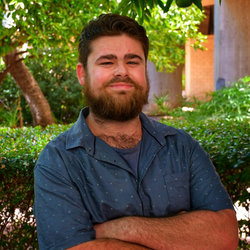
Public Health is a unique study area that provides a range of professional pathways to those who want to enact positive change and help others. Graduates are highly sought-after to address health challenges of local, national, and global significance.
Firstly… what is Public Health?
Public health professionals work with communities to improve population health and wellbeing through health promotion, policy-making, education, and research. While medical doctors generally aim to cure illness and injury on an individual level, public health professionals strive towards disease prevention, equity, and long-term solutions to health problems facing entire populations.

“I like the idea that instead of helping one person, you can help a community or a whole country, preventing an illness or disease before it even happens.” – Jamil Locker, Flinders Bachelor of Public Health student.
1. Graduate with greater career prospects and a competitive edge in the job market
There has never been a better time to study public health. The COVID-19 pandemic highlighted the importance of disease prevention and control, as public health becomes an increasingly significant focus for government plans worldwide. The Australian government, for example, is planning its establishment of an Australian Centre for Disease Control to improve Australia’s ongoing response to current and emerging public health emergencies.

Health Care and Social Assistance is Australia’s largest industry and is projected to have strong employment growth through to November 2026*.
A Public Health degree could open a range of employment opportunities, including:
- Public Health educator (patient navigator, tobacco quitline coach/smoking cessation specialist/diabetes/other chronic diseases)
- Health economist
- Environmental health specialist
- Climate change and health specialist
- Community development officer (eg. women’s and children’s heath, Aboriginal and Torres Strait Islander health)
- Biostatistician, data analyst
- Public policy and strategy consultant
- Public health nurse
- Urban planner
- Public health research officer
- Epidemiologist/data analyst.
“I hope that having the Public Health qualification will open many doors and enable career progression or change of direction… with role models such as the many lecturers within Flinders Public Health as well as the key public health officials in Australia today, the opportunities are endless!” – Tamika Regnier, Graduate Certificate in Public Health student.
Gain real-world experience and graduate job-ready through placements, practicums, field studies, and simulated workplace settings and assessment activities. Flinders’ public health degrees are taught by academics who are experts in their fields and are designed to provide practical skills and industry networks ensuring graduates are ready to begin their career paths.
Graduates also increase their chances of a place in the highly regarded postgraduate Doctor of Medicine (MD) course at Flinders University, being eligible for consideration under the admissions sub-quota for 30% of available places.
2. Choose from a range of professional pathways and specialties
Professional variety and advancement are other great reasons to consider public health studies. As a wide-ranging interdisciplinary study, public health offers the versatility to work across different sectors, offering almost limitless opportunities for professional specialisation.

Public health professionals are at the forefront of research, practice, and service in nonprofits, community organizations, higher education, government, private industry, and health care.
Potential employers include:
- World Health Organization and United Nations
- Government departments (e.g health in policy, surveillance, health promotion)
- Drug and alcohol services
- Environmental Health
- Research and higher education settings
- Community organisations (e.g Heart Foundation and Cancer Council)
With topics including epidemiology, economics, health promotion, biostatistics, Indigenous studies, environmental change and leadership, the Flinders program uses current events as a “teaching lab” to help students understand the broader concepts of Public Health and its critical role in policy, population, empowerment, and cooperation for the greater good.
“I’ve been able to undertake a range of topics with an interdisciplinary focus, allowing me to learn from other students and teaching staff from different backgrounds. This opportunity has really benefited my learning.” – Isabelle Haklar, Flinders Master of Public Health student.
3. Positively impact local or global health
One of the most rewarding reasons students are drawn to a career in public health is the potential to implement positive change. Advocate to improve health in local communities or have a worldwide impact by guiding public policy and contributing to international health initiatives.

People who enjoy helping others, solving problems, or are committed to social justice find great job satisfaction in this field.
“When you study Public Health, you really unleash your potential to make a difference in the world. One of the benefits of being a public health professional is the global reach to go beyond the individual and have a greater impact.” – Dr Annie Murray, Flinders Public Health (Former) Course Coordinator.
If you are interested in a degree with boundless career prospects and the chance to impact global health, explore Public Health at Flinders University.

